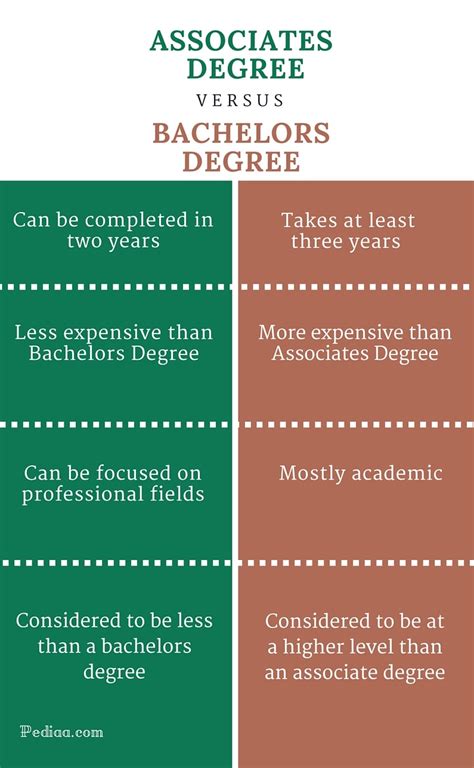Introduction

The pursuit of higher education can be a transformative journey, but it’s crucial to make informed decisions about the type of degree that best aligns with your career aspirations and lifestyle. Two prevalent educational pathways are bachelor’s and associate’s degrees, each offering distinct benefits and drawbacks. In this comprehensive guide, we delve into the key differences between bachelor’s vs. associates to help you chart the optimal course for your academic and professional future.
Bachelor’s Degree: A Comprehensive Foundation
A bachelor’s degree signifies a broad and comprehensive undergraduate education. It typically takes four years of full-time study and covers a wide range of subjects within a chosen major.
Benefits:
- Higher Earning Potential: According to the U.S. Bureau of Labor Statistics, individuals with a bachelor’s degree earn significantly more than those with only an associate’s degree.
- Career Advancement Opportunities: A bachelor’s degree opens doors to a wider range of career possibilities, especially in managerial or specialized roles.
- Intellectual Stimulation: Bachelor’s programs foster critical thinking, problem-solving, and research skills that enhance lifelong learning.
Drawbacks:
- Time and Financial Commitment: Pursuing a bachelor’s degree requires a significant investment of time and money.
- Overqualification for Some Jobs: In some fields, an associate’s degree may be sufficient for entry-level positions.
Associate’s Degree: A Focused Path
An associate’s degree is a two-year postsecondary degree that focuses on developing specific technical or professional skills. It provides a more targeted education than a bachelor’s degree.
Benefits:
- Quick and Affordable: Associate’s degrees can be completed in a relatively short amount of time compared to bachelor’s degrees, making them more accessible and affordable.
- Career-Specific Training: These programs prepare students for specific occupations, providing them with the necessary skills to enter the workforce.
- Flexibility: Associate’s degrees can often be transferred or applied towards a bachelor’s degree, offering flexibility in career planning.
Drawbacks:
- Limited Career Options: Associate’s degrees may restrict career advancement opportunities in certain fields where a bachelor’s degree is required.
- Lower Earning Potential: On average, individuals with associate’s degrees earn less than those with bachelor’s degrees.
Comparison Table: Bachelor’s vs. Associates
| Feature | Bachelor’s Degree | Associate’s Degree |
|---|---|---|
| Duration | Typically four years | Typically two years |
| Coursework | Broad and comprehensive | Focused and career-specific |
| Earning Potential | Higher | Lower |
| Career Advancement | More opportunities | Limited opportunities |
| Intellectual Development | Fosters critical thinking and problem-solving | Provides technical and practical skills |
| Time and Financial Commitment | Significant | Less significant |
| Overqualification | Possible for some entry-level positions | Not typically |
Choosing the Right Degree: Factors to Consider
The best degree for you depends on your individual goals, career aspirations, and financial situation. Consider the following factors when making your decision:
- Career Path: Research the educational requirements for your desired career field.
- Financial Implications: Assess the cost of each degree and the potential return on investment.
- Time Commitment: Determine if you have the time and resources to commit to a bachelor’s program.
- Transferability: If you plan to pursue a bachelor’s degree later, consider the transferability of credits from an associate’s program.
Tips and Tricks for Success
- Seek Academic Advising: Consult with academic advisors to gain personalized guidance and explore your options.
- Explore Scholarships and Financial Aid: Research financial assistance programs to reduce the cost of higher education.
- Engage in Internships and Experiential Learning: Gain hands-on experience and build your resume.
- Network with Professionals: Connect with individuals in your field to learn about job opportunities and industry trends.
- Stay Informed: Conduct ongoing research to stay abreast of educational trends and career advancements.
Applications: Beyond Traditional Career Paths
While bachelor’s and associate’s degrees typically prepare individuals for specific careers, these qualifications can also empower graduates to explore innovative applications and entrepreneurial ventures.
- Freelance Writing and Content Creation: Graduates with strong communication and writing skills can pursue freelance writing, blogging, and social media marketing.
- App Development and Software Engineering: With technical skills acquired through associate’s programs, individuals can develop mobile applications and contribute to software development projects.
- Event Planning and Management: Bachelor’s degrees in hospitality or event management open doors to careers in event planning, catering, and venue management.
- Entrepreneurship and Small Business Ownership: A solid foundation in business and management, gained through bachelor’s programs, can equip graduates with the knowledge and skills to start their own ventures.
Conclusion
Choosing between a bachelor’s and an associate’s degree is a critical decision that requires careful consideration of your goals and circumstances. By understanding the distinct benefits and drawbacks of each degree type, you can make an informed decision that sets you on the path to a fulfilling and successful future. Remember to seek guidance, explore your options, and stay informed to maximize the potential of your higher education journey.
